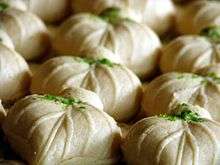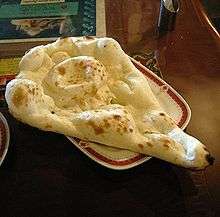Sandesh (confectionery)
 Nollen sandesh from West Bengal, India | |
| Course | Dessert |
|---|---|
| Place of origin | India, Bangladesh |
| Region or state | Bengal |
| Main ingredients | Chhana / paneer, sugar, jaggery (gurr), condensed milk |
|
| |
Sandesh (Bengali: সন্দেশ Shôndesh; Sylheti: হান্দেশ Handesh; Hindi: संदेश) is a Bengali dessert created with milk and sugar.[1] Some recipes of Sandesh call for the use of chhena or paneer (which is made by curdling the milk and separating the whey from it) instead of milk itself.[2] Some people in the region of Dhaka call it pranahara (literally, heart 'stealer') which is a softer kind of sandesh, made with mawa and the essence of curd.[3]
History
A sweet dish by the name sandesh is mentioned in medieval Bengali literature, including Krittibas' Ramayana and lyrics of Chaitanya. However, the ingredients of this original dish are not known.[4] This dish was most likely different from the modern chhena-based sandesh, being made of soldified kheer.[5][6]
It is hard to determine when exactly did sandesh started referring mainly to the chhena-based sweet instead of the kheer-based sweet. But it is known that by the second half of the 19th century, sandesh commonly referred to the chhena-based sweet.[7] The Portuguese influence may have led to introduction of cheese (i.e. chhena) in sixteenth century.[4]
Preparation
Sandesh can be made with the use of chhena or cottage cheese. The simplest kind of sandesh in Bengal is the makha sandesh (makha = kneaded). It is prepared by tossing the chhena lightly with sugar over low heat. The sandesh is essentially hot, sweetened chhana. When shaped into balls, it is called kanchagolla (kancha = raw; golla = ball). For more complex and elaborately prepared sandesh, the chhana is dried and pressed, flavored with essence of fruits, and sometimes even colored, and cooked to many different levels of consistencies. Sometimes it is filled with syrup, blended with coconut or kheer, and molded into a variety of shapes such as conch shells, elephants, and fish. Another variant is nolen gurer sandesh, which is made with gur or jaggery. It is known for its brown or caramel colour that comes from nolen gur.
References
- ↑ Sandesh
- ↑ Sandesh Mishti
- ↑ Albala, Ken, ed. (2011). Food Cultures of the World Encyclopedia. Volume 1: Africa and the Middle East. Santa Barbara, Calif.: Greenwood. p. 34. ISBN 978-0-313-37627-6.
- 1 2 Meenakshi Das Gupta, Bunny Gupta and Jaya Chaliha (2000). Calcutta Cookbook: A Treasury of Recipes From Pavement to Place. Penguin UK. p. 338. ISBN 9789351181491.
- ↑ Harlan Walker, ed. (2000). Milk - Beyond the Dairy: Proceedings of the Oxford Symposium on Food and Cookery 1999. Oxford Symposium. p. 57. ISBN 9781903018064.
- ↑ Michael Krondl (2011). Sweet Invention: A History of Dessert. Chicago Review Press. pp. 55–59. ISBN 9781556529542.
- ↑ Chitrita Banerji (2006). The Hour of the Goddess: Memories of Women, Food, and Ritual in Bengal. Penguin. pp. 117–120. ISBN 9780144001422.
External links
| Wikimedia Commons has media related to Sandesh. |
- Sweetmeats in Banglapedia


